
![]()
![]()
![]()
|
|
|
PAGE CONTENTS This page will examine various enclosure arrangements for chameleons and a few other basic husbandry topics.
| ||||||||||||||||||||||||||||||||||||||||||||||||||||||||||||||||||||||||||||||||||||||||||||||||||||||||||
The size requirement of the species you are getting. Remember most chameleons are arboreal (tree dwellers) and prefer height over length. A good size is calculated by using the guide (HBL = snout to vent length) |
For arboreal (height loving tree dwellers) species
short side of bottom = 3 x HBL
long side of bottom = 4 x HBL
height = 6 x HBL
For terrestrial (ground dwellers) species i.e. Brookesia
short side of bottom = 4 x HBL
long side of bottom = 6 x HBL
height = 4 x HBL
|
A good cage for chameleons will be screen on at least three sides- they need fresh air, avoid glass and plexi-glass - the reflection causes stress (seeing another cham) and STRESS KILLS | |
|
You should be able to maintain a noticeable temperature gradient - depending on species some as much as 30 degrees from basking spot to cool down. Remember they regulate their body temp (cold blooded) thru basking | |
|
It should allow good humidity control, not too open and not all solid walls | |
|
It should be able to sustain a lot of watering without rotting or rusting | |
|
It is best if feeder insects can not escape, but the screening used should be open enough not to cause injury to your cham's feet and resistant to crickets eating it | |
|
You should be able to place a basking light and/or a UVB light on it without melting or burning the walls | |
|
You should be able to view your chameleons but there should be plenty of leafy cover for them to hide in. They do not need ground cover i.e. hollow logs. | |
|
They do not need water bowls or bottles, they drink droplets of of misted leaves (moving water) | |
|
They need lots of various size branches and vines to climb around on. This lets them exercise those very strong hands and legs. | |
|
Substrates are not recommended with chameleons. They can be ingested and cause impaction leading to premature death. | |
|
Live plants are recommended. some species of chameleons will actually EAT the plants. If a tropical house plant can not survive in your enclosure then it is not right for the chameleon either. most have very similar requirements. | |
|
You need a to use BOTH a basking light a regular 60 to 100 watt light (depending on the size of your cage and species of cham) works fine and florescent (ZooMed's REPTISUN 5.0 ) UV lighting |
|
Very typical and terribly incorrect set-up This very typical set-up was found in a pet store. The picture quality is not great, but the idea is to show the DON'TS of chameleon keeping. this female veiled was in an all glass aquarium with a solid top. I was able to get them to put a screen top on it, and use the dripper for water, but it was already much too late. If you look closely you can see the dark rings around her sunken eyes. she was badly dehydrated and probably suffering from a URI (Upper Respiratory Infection) as well. Her tongue was dark yellow with black spots, not the light pink that a healthy chameleon should have. |
|||
|
LDS Cages Bottoms
are 1/8 inch white high impact plastic. All cages are made with a solid
bottom. Yes we can make your cage with a screen bottom. The wire color
is charcoal . the frame color is charcoal. All Corner's are mitered .
Our cage can be put in direct sunlight . Every cage is hand made ! The
top as well as the sides are wire.
Lightweight, somewhat portable, well made, affordable, easy to clean, and designed for chameleon housing. back to top
|
|||
|
LIZARD/BIRD
CAGE PVC GREEN MARTIN'S
THESE DURABLE, HIGH QUALITY CAGES FEATURE A DOUBLE ZINC COATED AND
PVC FINISH COATING. THE PVC IS RESISTANT AGAINST HIGH TEMPERATURES AND
ULTRAVIOLET RAYS. seethatpetplace on LINKS PAGE back to top
|
|||
|
REPTARIUM The REPTARIUM takes into consideration the basic needs in terms of air, hygiene and overall happiness of a captive reptile. We feel that the well being of your reptile will improve significantly with your use of the REPTARIUM, a product designed not for fish, or a revision of a fish tank to broaden their market, but solely for the explicit purpose of modern reptile containment utilizing the most current knowledge of reptiles and their unique yet simple needs. Walls of the REPTARIUM are constructed of reinforced nylon. Nylon is also cricket proof, where fiberglass is not. The openness of our mesh allows the reptile to feel less like it is enclosed and allows full sensory perception of it's surroundings. see Herpsupplies.com or Reptile Depot.com on LINKS PAGE Can be hard to clean, the black has a slight problem with visibility (good for the cham bad for the chamowner), the white looks much better for visibility. Not a bad choice and comes in many sizes. back to top
|
|||
|
CHAMELEON CANOPY The TOP DOME creatively conceals both the lighting system and the drip system. It also keeps chameleons from escaping because they can not grip on to the wide smooth rim. On the rear side of the Top Dome is a fill spout for adding water to the adjustable flow rate drip system. The CONFINEMENT BOWL prevents chameleons and live prey items from escaping. Its smooth inner surface keeps crickets and chameleons from scaling the wall. The system also keeps crickets from climbing up the ropes-- they are always trapped inside of the confinement bowl. Only your chameleon can explore the free climbing area. see chameleons.net canopy cage or ReptileDepot.com on LINKS PAGE Unique, interesting appearance, GREAT roaming cage, difficult to control temp and humidity-only suitable for limited species if used as permanent home. back to top
|
|||
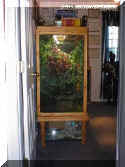
|
I build
three frames with 1x2 pine and corner braces, and then attach
plexi-glass fronts or screen sides to that. The back and bottom are
solid plywood covered with colored vinyl cloth to protect from water and
give a natural appearance. Then I frame the top out for the light
fixture with the same 1x2 ‘s and screen except for the area for the
light fixture which is a Home Depot 24” 2 light fluorescent fixture
with reptisun 5.0 added. I use a full-length hinge on the door, and trim
them out with some molding. Viola. see My Chameleons PHOTO Album on the LINKS PAGE for lots more pictures of my chams, misting system, and cages If you got time, some talent and tools, then this is a good option. you can customize it to your taste and available space (but make it big enough for the cham) back to top
|
||
HOME MADE PVC Using PVC pipes and PVC 90 deg. "elbow connectors" make rectangular "panels" to serve as the sides of the box that will be the finished cage. Cover these pipe panels with mesh by securing the mesh to the pipes with cable ties. Attach the panels together with bolts and butterfly clasps. Attach the door with large cable ties for "hinges" and latch closed with velcro or velcro Grippers (tm). It will look something like the photo to the left. see www.geocities.compvccage.html From the LINKS PAGE for more detailed instructions If the screening used on this is smooth enough to prevent injury to feet it could be a good cage, however, it was really designed for iguanas. back to top
|
|||



 |
HOME MADE SCREEN & PVC Using PVC pipes and casters to build stands worked great for this chameleon owner. These appear to be easily maintained. As you can see from the pictures, the top and front open for cleaning and maintenance. They are perched on top of plastic tubs, so overflow from misting should be no problem. Portable, lightweight, durable, and not bad looking, what more do you need? Excellent job. |
||

|
FREE ROAM HABITAT FOR MELLER'S CHAMELEON AS SEEN ON ANIMAL PLANET EMERGENCY VETS Photos Courtesy of Allison Banks In the center of the room, sheets of plywood to protect the carpet and provide a little air circulation. On top of the plywood platform, a ring of crates that surround a central "clearing". Cover the whole crate/plywood structure with heavy plastic sheeting.Potted Ficus alli trees and schefflera of different heights set on the crates or around the edges. A network of climbing branches from tree to tree, to lights, etc. wired to tree trunks.UVB and basking spotlights hung from the ceiling by hanging plant hooks. RainMaker Jr. misting system crosses the center of the "forest" from a stand in the corner of the room where the reservoir sits. All the spray is aimed to hit the tarp/tree area.An ultrasonic room humidifier up on stacked crates between 2 trees. In the central opening several inches of CareFresh cage bedding to absorb and hold moisture (raises the room humidity).A depression for accumulated water that I drain with a small portable pump into a bucket.So, basically, I created an island forest in the room. I can walk all around it and all the electrical cords run to various wall outlets. When I need to clean out the bedding I shovel it into a trashcan and dump it outside. I find its much easier to maintain than a cage big enough for the melleri as I don't have to climb into anything.Problems: the lights are hard to reach to change bulbs. Aiming the spray nozzles can be tricky as the chams love to walk or sleep along the water tubing and mess up the aim. I run everything on timers so all I basically do is change bulbs, fill reservoirs, drain water, and feed the chams. I do spray them individually for drinking though. I can hang feeding bins in the branches for them to find and shoot from. The bins are removed after each feeding and set in different spots next time.The ficus and schefflera are growing like crazy and I have to prune them back.In summer I run a small fan in the room doorway to keep the room from getting too hot. I guess that's it. Enjoy!Wouldn't all of our chams love this arrangement. |
||
|
|||
|
ACTIVE UVB HEAT LAMP By Active UV-Heat This lamp emits Ultraviolet (A & B) rays as well as visible light and heat. They project a beam of light and heat. No fixture, ballast or reflector is needed. Your animal should always be able to either bask in the light or move out of its beam. The Flood Lights should be approximately 12" to 18" away from the animal and the Spot Lights 24" to 30". This product has not been evaluated by me. Many people believe that you can not get UVB from a "screw in" bulb. back to top
|
|||
SORRY THAT'S AS BIG AS IT GETS |
REPTISUN
5.0 any of the supplier links should carry this one DESCRIPTIONS FROM THE ZOO-MED WEBSITE This is THE preferred UVB light by most chamowners. back to top
|
||


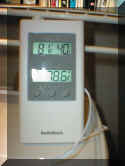 |
TIMERS AND THERMOMETERS These are MUST HAVE items. Cheap timers like the one on the left work great for most uses. I use the digital timer on the bottom for my misting system. it is more accurate on short times (4 - 5 minutes). The others do great for turning lights and humidifiers off and on .The thermometer pictured on the bottom is a Radio Shack model. I have seen similar products in Wal-mart for $15.00. It gives you humidity and two temperature readings PLUS it stores the high and low, which is great for long term monitoring. Well worth the extra money go to Wal-mart, Home Depot, or Radio Shack for purchase back to top
|
||

SORRY THAT'S AS BIG AS IT GETS
|
T-Rex Reptile Habitat ThermometerThe T-Rex Reptile Habitat Thermometer is an accurate and easy to read dial type thermometer that is designed for use INSIDE the reptile habitat. The T-Rex thermometer is different from other reptile thermometers currently on the market because it is not a digital strip. The T-Rex team has found that many, if not most, consumers assume the digital strip goes on the OUTSIDE terrarium glass, much like on their aquariums. This results in less than desired accuracy in temperature readings. The T-Rex Habitat Thermometer is compact and mounts naturally at any desired location inside the reptile's habitat, giving accurate readings in a wide range from 60 F to 120 F. For best results, use two: one in the hottest area of the enclosure, the "baking zone" and one in the coolest corner. User friendly instructions give general guidelines for
required temperature ranges of the most commonly kept reptiles. most of the supplier links should carry this one DESCRIPTIONS FROM T-REX WEBSITE spend the few extra
dollars on the digital combo back to top
|
||
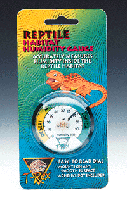
SORRY THAT'S AS BIG AS IT GETS
|
T-Rex Reptile Humidity Gauge Serious and knowledgeable hobbyists now understand the importance of accurately measuring humidity in order to maintain different types of reptiles, whether desert or tropical, in their proper natural environment. The T-Rex Reptile Humidity Gauge, like the T-Rex Thermometer, is an incredibly accurate and easy to read dial-type instrument that is designed for use INSIDE the reptile habitat. The gauge is compact and easy-to-mount, yet it measures relative humidity with an accuracy equal to that of laboratory instruments that cost up to 10 times more!! The T-Rex Reptile Humidity Gauge is custom designed to display
comparative readings for desert, moderate or tropical environments. User
friendly instructions give general guidelines for the required humidity
range of the most commonly kept reptiles. most of the supplier links should carry this one DESCRIPTIONS FROM
T-REX WEBSITE back to top
|
||
 |
HYDRATION |
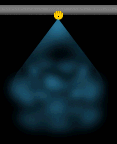 |
|
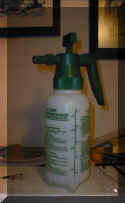 |
MANUAL SPRAYER Some form of manual sprayer is a MUST HAVE . The one pictured is a great indoor sprayer. It holds 2.5 pints of water and has a pump to pressurize it, which saves a lot of trigger squeezing. It works like a larger garden sprayer. This one costs around $6.00 at Home Depot or Wal-mart. go to Wal-mart or Home Depot for purchase back to top
|
||
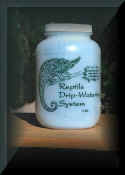
 |
REPTILE DRIP-WATERER These come in two sizes, one gallon and one pint. They are great for drip watering but should NOT be the only method of hydration used. most of the retailers on the LINKS PAGE and local pet stores should have these back to top
|
||

 
 |
MISTING SYSTEM This is a great time saver. you can design and build your own misting system using 1/4 inch tubing and sprayer heads from a hardware store. they make lots of different types of heads from drippers to misters, and they are inexpensive. The pump is the costly part of this and can run $20 to $100 depending on selection. You should still carefully monitor their drinking habits and mist them manually as well. HYDRATION is the most important aspect of chameleon husbandry and should be given the time and resources required to do it properly. go to Wal-mart or Home Depot, for purchase or visit MISTING SYSTEMS AND PARTS on the LINKS PAGE back to top
|
||
|
HUMIDIFIER You can purchase an ultrasonic humidifier at most drug stores or big chain retailers (WAL-MART TARGET) for around $20.00. They are worth the money for most species. They help control relative humidity and temperature. This one has been modified with PVC pipes and vinyl tubing to direct the output to three cages. These are not required, but come in very handy. Be sure to keep them clean if you use one. go to Wal-mart, Target or any drug store for purchase back to top
|
|||
| This site can in no way be reproduced or copied without the expressed written permission of David Pickering. I have given credit where the author is known. If I have used any material without your permission or without the proper credit please inform me and it will be corrected.Copyright©2000 David Pickering. |